Global Expedition Vehicles
Exploring the Earth, Roads are Optional
Article Date: March, 2015
Article and Photography by Mark Quasius
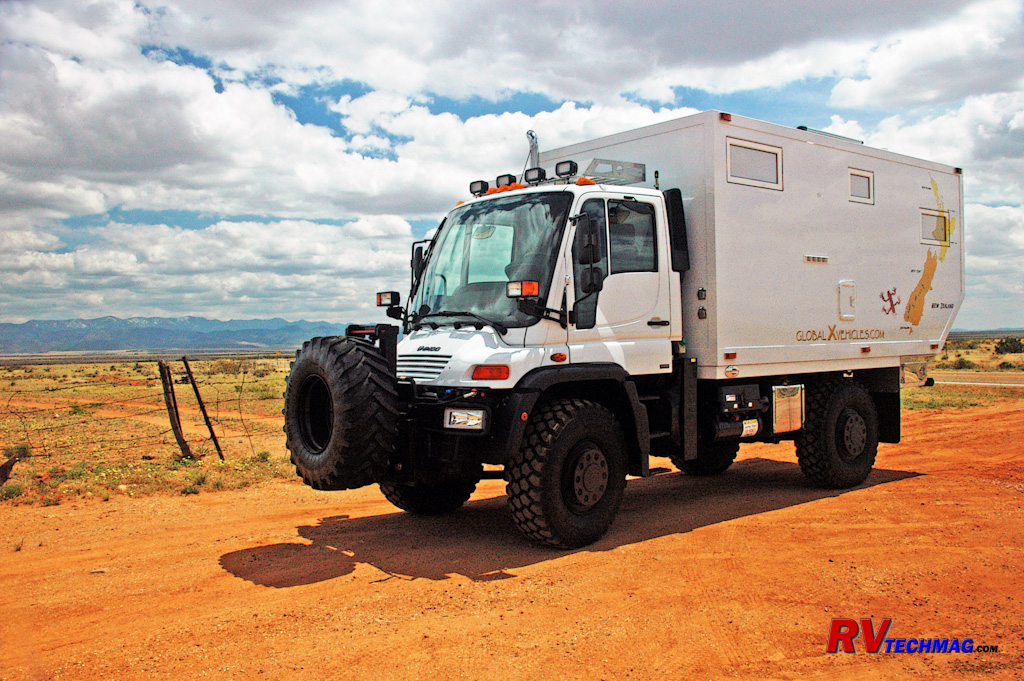
Safari Extreme
The vehicle we spent the most time with was the Safari Extreme, which is built on a Mercedes Unimog chassis. This chassis is
nothing short of amazing. Three locking differentials allow you to lock either axle from left to right as well as a center differential to lock both
axles together. The electronic shift transmission lets you select the desired gear and range. When you stab the clutch the transmission automatically
shifts to that gear. The forward control cab has a deep windshield that lets you see the area immediately in front of the vehicle. When driving a
Unimog chassis I was surprised to find how it handled. It stuck to the road on curves like a sports car, yet when it came time to go off road it
escalated to simply amazing. As a passenger, climbing a steep bank all I saw was sky. Cresting the bank was effortless and going down the other side
I was so close to vertical that all I saw was the ground ahead of me and had to place my hands on the windshield to keep from leaving nose prints on
the glass. The vehicle was truly unstoppable.
The Unimog chassis is designed for universal travel. Simply release a few locking levers and the entire instrument panel,
steering wheel and foot pedals can be slid from side to side to accommodate left hand drive or right hand drive. The chassis has numerous power
take-off options. A front mechanical PTO can be used as a drive source while a number of hydraulic connections allow use of hydraulic accessories.
Winches and auxiliary lighting are all standard on GXV vehicles. Spare tires can be mounted on the front bumper or on the rear of the vehicle with
a lowering mechanism. A cargo carrier is mounted to the roof of the cab for carrying bulky cargo, water cans, food storage, etc.
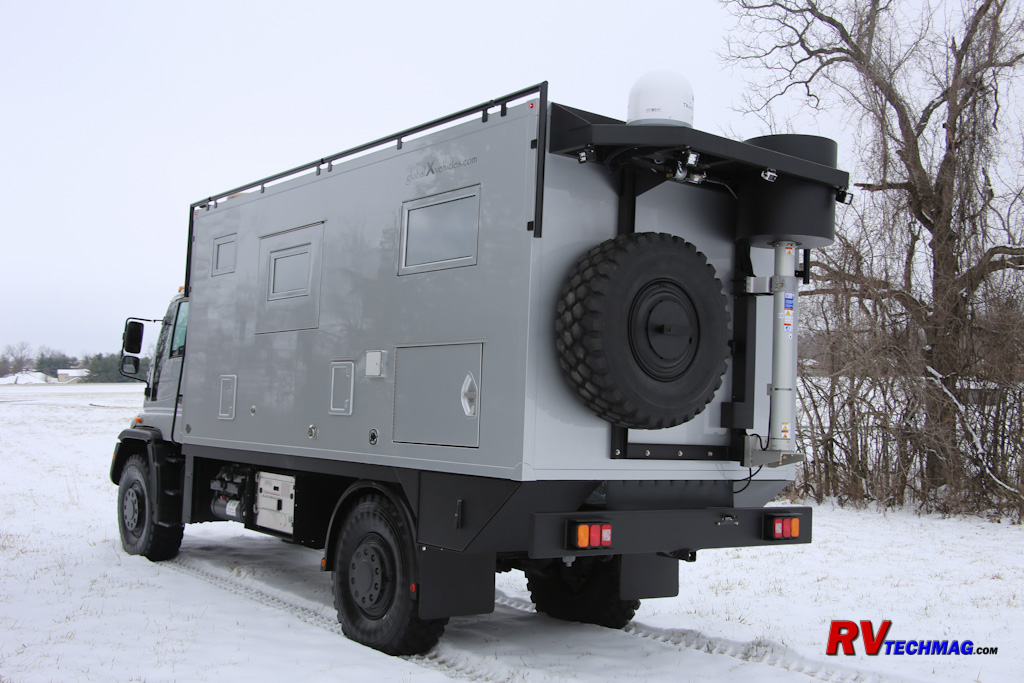
Vehicles can be custom ordered and equipped to meet each customer's needs. This particular unit was destined for an African safari company and
included a mast that telescopes to 27' which includes a high end camera that displays images inside the vehicle on a 46" TV. The window over
the dinette is mounted in a large flip-out wall section that can be opened up to afford a greater viewing area
Durability
Now that we've established that GXV vehicles can get to out of the way places, the next issue is durability. The stress of
overland travel creates unique requirements on this type of vehicle. GXV begins by mounting their coach to the frame with a proprietary Kinetic
Mounting System that prevents the coach from flexing by allowing the frame and suspension to articulate and twist but isolates those dynamic forces
from the expedition body. This system also helps to isolate the coach from road vibration and noise when driving. Every GXV design is rigorously
tested for articulation and stress with a cross test.
The sidewalls are constructed with a structural composite sandwich panel. This eliminates thermal conduction paths by
eliminating any aluminum tubing required in normal stick framed construction. The fiberglass reinforced polyester outer plies are vacuum bonded to
the inner foam and finished with a gel coat. Typical wall thickness is 60mm (2.36") and provides superior strength to handle the flexing, wind and
extreme temperatures of overland travel. The 110mm floor structure is similar but also includes an integrated welded frame structure.
|
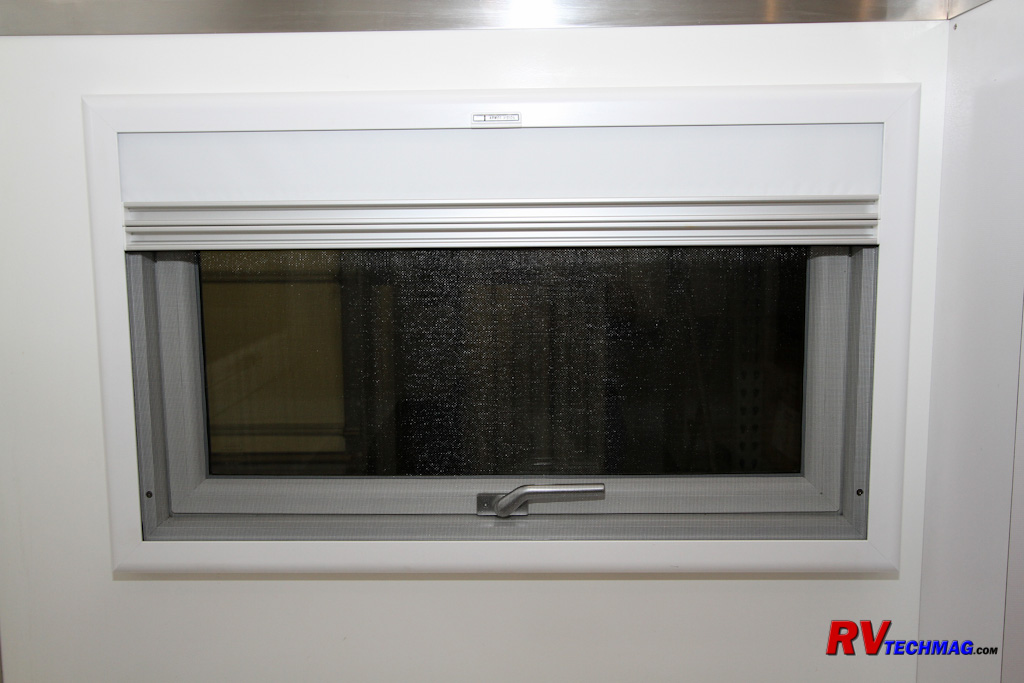
GXV windows are fitted with day/night shades encapsulated in a sliding track design. The screen portion slides up from the bottom while the
privacy portion slides down from the top. Magnets in the end rails allow the shades to lock in place or even meet at any point in the track.
|
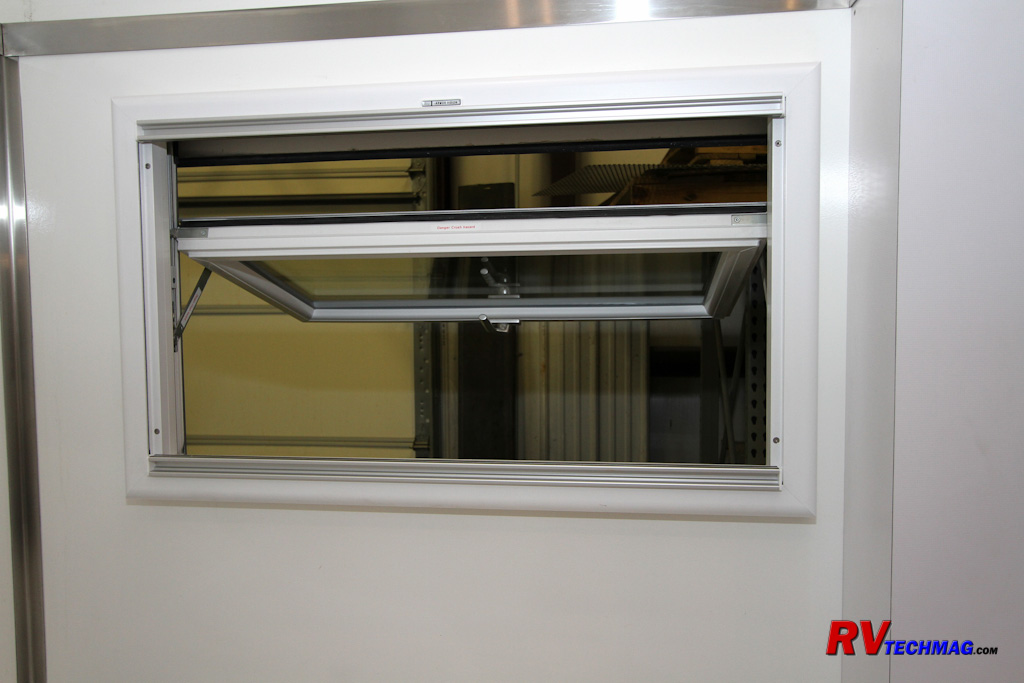
The dual pane windows are awning style and can be extended beyond 90 degrees to allow easy cleaning from inside the vehicle.
|
|
GXV exclusively uses Armor Vision windows. These windows use dual pane glass that is burglar, scratch and fade proof with
high thermal qualities. They are flush to the exterior and have dual stainless steel locking points for extra security. These awning style windows
slide down mid-point to the horizontal position for ease in cleaning from the inside of the vehicle. Integrated privacy blinds and mosquito screening
provide 100% sealing with no gaps for insects to get through. Optional stainless steel protection plates provide security and protection if you plan
to ship your expedition vehicle to another country.
All entry door and compartment hatch cover latch mechanisms are integrated into the body panels
with a 3 point stainless steel latching mechanism. This provides a high level of security as well as strength and durability.
|

Door latches are built for extreme durability and security. The same high quality latches are also utilized in the trunk and exterior
storage compartments.
|
GXV utilizes efficient marine grade wiring and electrical components to maximize available power and minimize electrical
consumption. Typical flooded batteries can only be used to around 50% of their rated capacity without damage to the battery and also need to be
located in a vented exterior compartment due to the hydrogen outgassing during charging. AGM batteries remove the outgassing element and offer a bit
more useable amp-hrs before battery damage but still aren't perfect. GXV utilizes Lithium-Ion batteries, which are the ultimate, although quite
expensive. With Lithium-Ion batteries there is no outgassing and the full rated amount of the battery capacity can be used. GXV places Lithium-Ion
batteries in a storage area inside the body and gives a GXV vehicle the maximum possible battery power.
|
Solar panels and optional wind powered generators provide recharging power through an Outback MPPT charge controller to
help keep these batteries charged up. In addition to an Outback 2,800 watt true sine wave inverter, many units are equipped with a diesel powered
generator to provide AC power whenever needed. Expedition vehicles rarely plug into shore power but dual external power inlets are provided to
accommodate either 50 or 60 Hz utility power when available. GXV units are dual voltage capable.
|
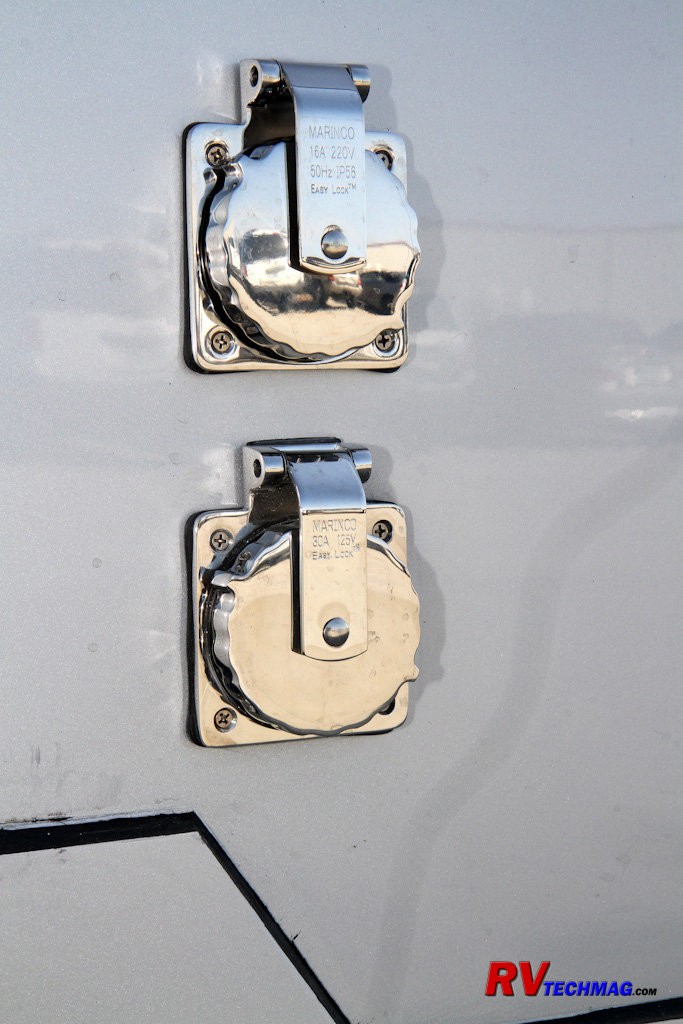
Electrical systems are dual voltage and can be run on 60 Hz stateside power or 50 Hz power found in Europe and most other countries.
|
Plumbing needs are met by a 125 gallon fresh water tank and 25 gallon gray water tank. A cassette toilet is provided for
convenient waste disposal when traveling overland. All plumbing is installed inside the vehicle to prevent any possibility of freezing when camping in
cold weather. A water filtration system is provided and filling the fresh water tank from a stream is possible via a water pump and the microbiological
drinking filter installed at the kitchen sink. HVAC systems consist of a 15,000 BTU air conditioner with heat pump and a Webasto hydronic heating
system that also serves as an engine block preheater. Domestic hot water needs are met by an Isotherm hot water heater, which is heated by the Webasto
boiler.
|
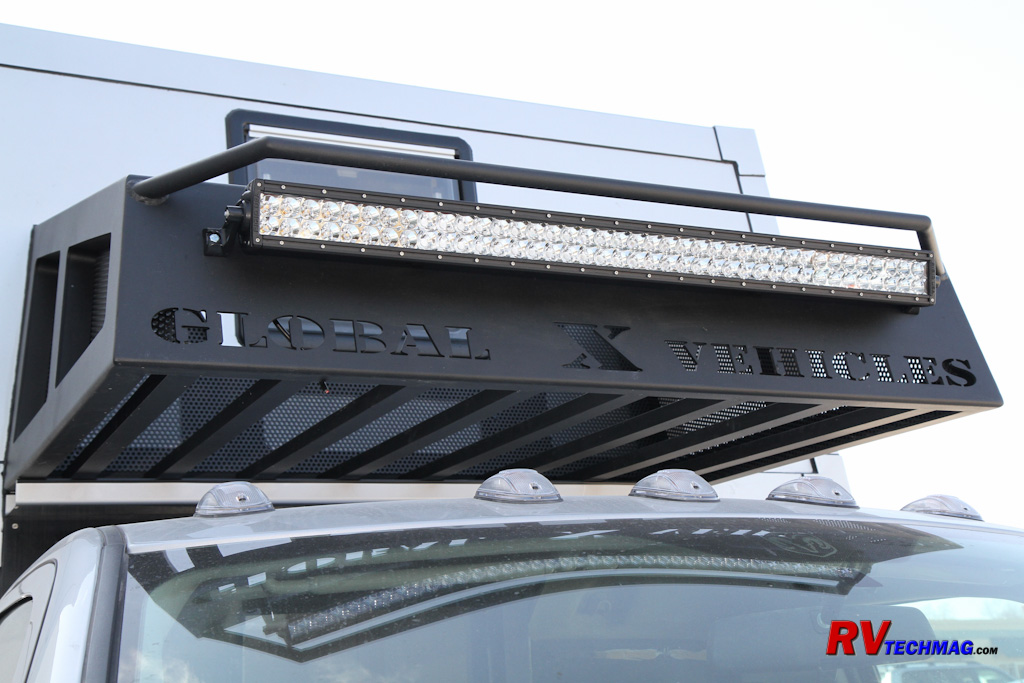
Every vehicle gets a roof cargo rack, as shown on this UXV-550 model.
|
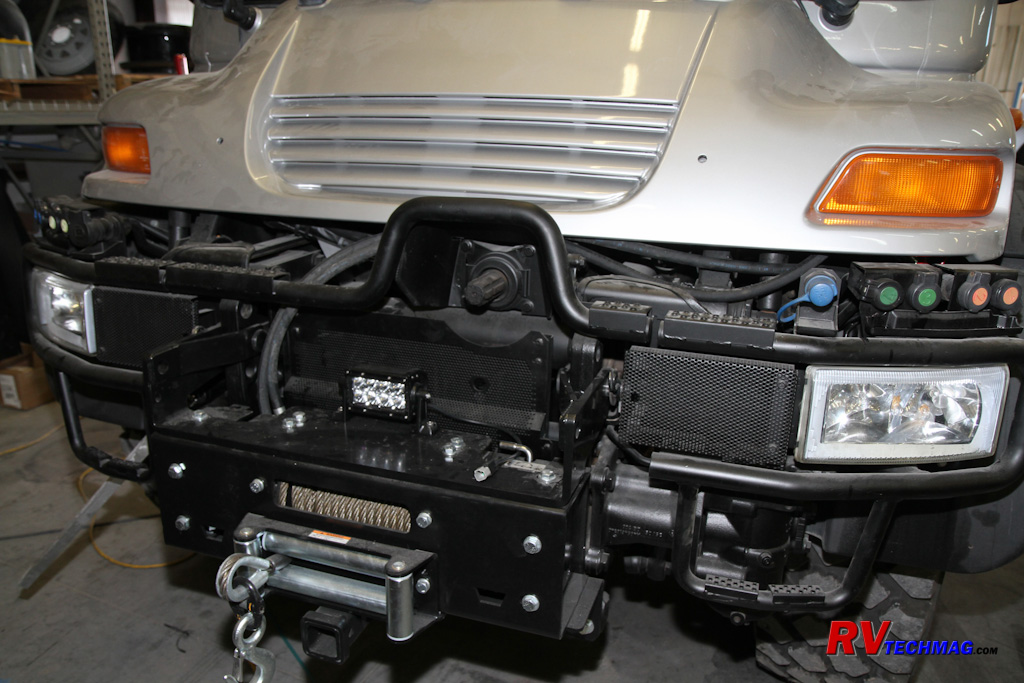
A typical Unimog chassis features a mechanical power take-off unit, hydraulic winch, and various connection ports for other
hydraulic accessories or tools.
|
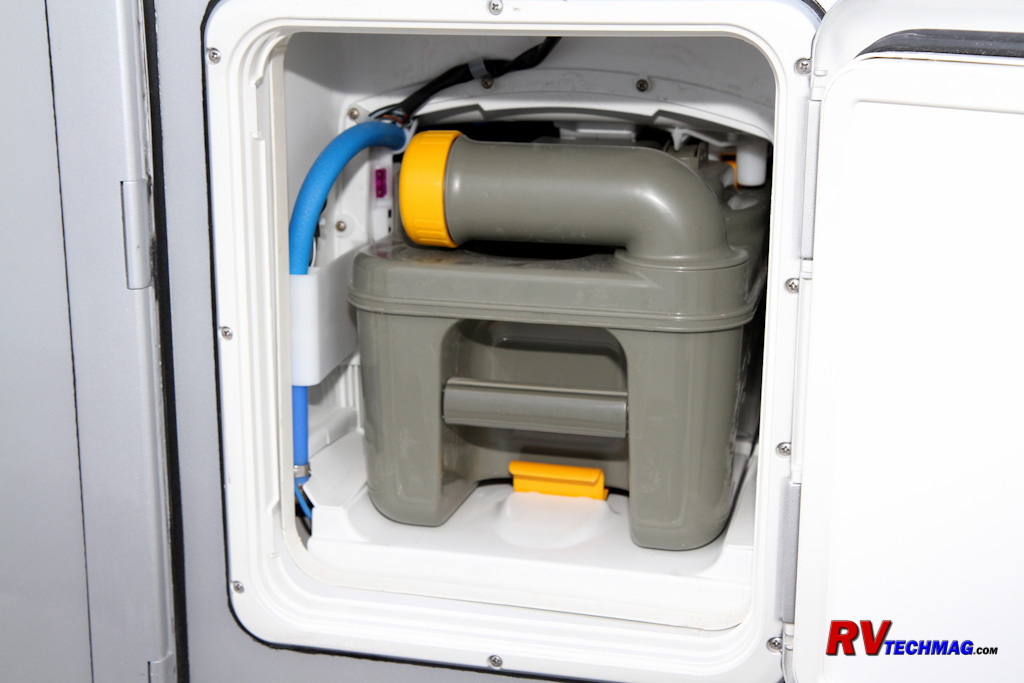
Some models, such as the UXV-550, include a cassette style toilet to allow waste removal and burial in remote areas.
|
Return to Home Page
If you enjoyed this article be sure to recommend RVtechMag.com to your friends, like us on Facebook or Twitter
or subscribe to our RSS feed.



|













